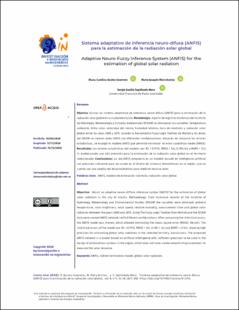Sistema adaptativo de inferencia neuro-difusa (ANFIS) para la estimación de la radiación solar globa
Adaptive Neuro-Fuzzy Inference System (ANFIS) for the estimation of global solar radiation
Artículo de revista
2020-12-14
Investigación e Innovación en Ingenierías
Colombia
Objetivo:Ajustar un sistema adaptativo de inferencia neuro-difusa (ANFIS) para la estimación de la radiación solar global en la ciudad de Cúcuta. Metodología: A partir de registros históricos del Instituto de Hidrología, Meteorología y Estudios Ambientales (IDEAM) se obtuvieron las variables: temperatura ambiente, brillo solar, velocidad del viento, humedad relativa, hora de medición y radiación solar global entre los años 2005 y 2015. Usando la herramienta Fuzzy Logic Toolbox de Matlab y los datos del IDEAM se crearon redes ANFIS con diferentes configuraciones. Después de comparar los errores estadísticos, se escogió el modelo ANFIS que permitió minimizar el error cuadrático medio (RMSE). Resultados: Los errores estadísticos del modelo son: R2 = 0.9115, RMSE = 124,23 Wh/m2 y MAPE = 27,8 %, evidenciando una alta precisión para la estimación de la radiación solar global en el territorio seleccionado. Conclusiones: La red ANFIS propuesta es un modelo basado en inteligencia artificial con precisión suficiente para ser usado en el diseño de sistemas fotovoltaicos en la región, que no cuenta con una amplia red de piranómetros para medir el recurso solar. Objective: Adjust an adaptive neuro-diffuse inference system (ANFIS) for the estimation of global solar radiation in the city of Cúcuta. Methodology: From historical records of the Institute of Hydrology, Meteorology and Environmental Studies (IDEAM) the variables were obtained: ambient temperature, solar brightness, wind speed, relative humidity, measurement time and global solar radiation between the years 2005 and 2015. Using The Fuzzy Logic Toolbox from Matlab and the IDEAM data were created ANFIS networks with different configurations. After comparing the statistical errors, the ANFIS model was chosen, which allowed minimizing the mean square error (RMSE). Results: The statistical errors of the model are: R2 = 0.9115, RMSE = 124.23 Wh / m2 and MAPE = 27.8%, showing high precision for estimating global solar radiation in the selected territory. Conclusions: The proposed ANFIS network is a model based on artificial intelligence with sufficient precision to be used in the design of photovoltaic systems in the region, which does not have a wide network of pyranometers to measure the solar resource.
Descripción:
Sistema adaptativo de inferencia neuro-difusa (ANFIS) para la estimación de la radiación solar global.pdf
Título: Sistema adaptativo de inferencia neuro-difusa (ANFIS) para la estimación de la radiación solar global.pdf
Tamaño: 582.2Kb
 PDF
PDF
 LEER EN FLIP
LEER EN FLIP
Título: Sistema adaptativo de inferencia neuro-difusa (ANFIS) para la estimación de la radiación solar global.pdf
Tamaño: 582.2Kb
 PDF
PDF
 LEER EN FLIP
LEER EN FLIP
















